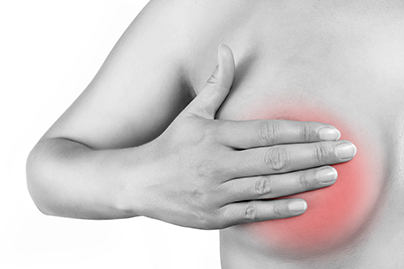Breast cancer is a growth of malignant or harmful cells that starts in breast tissue and may grow and spread to other parts of the body.

Breast cancer is one of the leading causes of cancer deaths in women. It is estimated that approximately 1 in 8 (12%) U.S. women will develop invasive breast cancer in their lifetime.1 There may not be any warning of breast cancer, however, if you notice any of the following signs or symptoms, you may need to see your doctor:
Breast cancer is much more common in industrialized countries, suggesting lifestyle and environmental risks are the strongest factors. Genetic markers have been discovered as well, but about 90% or more of women with breast cancer do not have a genetic risk factor for breast cancer. In general, cell damage that develops into cancer always has some agent or combination of agents that cause changes and damage to cell structure. This damage can occur early in life, even before birth, and is cumulative. Causative risks include exposures to chemicals, supplemental hormones, radiation exposure, early first menstruation, obesity, sedentary lifestyle, alcohol use, tobacco use, and high animal product intake. Eating a diet high in vegetables and fruits in general has been found to correlate with lower risk of breast cancer, and this is likely related to the cancer protective nutrients found in these foods. Childhood and adolescence seems to be the most important time to use protective foods and avoid risky behaviors that increase risk.
Read more: Do you have a supplement formulated to enhance protection against cancer?
Regular physical activity is associated with lower risk of cancer. Moderate exercise is helpful, and vigorous exercise provides even more protection.15
Position Paper: IGF-1, Dietary Protein and Cancer
Sign up for the online Combat Autoimmune Disease and Cancer Masterclass
ONLINE: All members of DrFuhrman.com can search the Ask the Doctor archives for discussions on this topic. Platinum and Diamond members can connect with Dr. Fuhrman by posting questions in the forum. Not a member? Join now.
IN PERSON or ONLINE: Book a consultation with a specialist at Longevity Rx in San Diego, California, run by Joel Fuhrman, MD and Cara Fuhrman, ND. Using nutritional protocols, cutting-edge screening tools, advanced imaging, and innovative treatments for pain and injuries, they'll create a personalized action plan to help you prevent and recover from illness, and achieve your optimal weight. Book online at Longevity Rx or call +1 (858) 367-3558
EVENTS: Join Dr. Fuhrman for an online boot camp, detox or other event. During these immersive online events, you’ll attend zoom lectures, follow a special meal plan, and have access to a special, live Q&A session with Dr. Fuhrman. Learn more about events.
The following are sample questions from the Ask the Doctor Community Platinum and higher members can post their health questions directly to Dr. Fuhrman. (All members can browse questions and answers.)
Do you have a supplement formulated to specifically to enhance protection against cancer?
Dietary supplements by definition do not treat, prevent, or cure a disease and cannot claim to on labels or in advertising. However, plant extracts are continually being studied for their potential to maintain health and affect the disease process. Clinical trials are being conducted, aiming to figure out whether certain plant extracts could affect cancer-related biomarkers, act as beneficial adjunct treatments to be used with chemotherapy, or help to prevent progression of an early stage cancer or pre-cancerous condition. Read more
I was just diagnosed with breast cancer. I follow a vegan diet and I have been using soy milk in place of dairy milk, 1 to 2 cups per day, and use other soy products. Should I avoid soy which increases the estrogen in your body?
The potential problem here stems from your use of the word "vegan" diet and not "vegan-Nutritarian" diet because the anti-cancer power comes from the careful inclusion of the plant foods with the most documented benefits against cancer–G-BOMBS. For example, a very low fat, high carb vegan diet will not expose you to enough phytochemical benefits and will decrease their absorption. So the question is, where do the two cups of soy milk come into play in your diet? It is a processed food with limited antioxidants and phytochemicals, so if you are using it as a drink, it would make more sense to drink a glass of carrot, kale, lemon, tomato, and ginger juice. It is not that unsweetened soy milk is bad, but that it may reflect an overall lack of attention to the optimal choice of foods.
Avoiding all soy has no benefit for breast cancer patients and does not increase estrogen in the body. Unprocessed soy beans and tempeh are excellent foods. You should not eat isolated soy protein or overly processed soy products. Use miso sparingly and only low salt varieties. Tofu and tempeh are fine, and use unsweetened soy milk in limited quantities.
I was recently diagnosed with breast cancer. I have started to follow a Nutritarian diet in hopes of reversing it. A local physician told me that more than 1/3 cup of fresh or frozen fruit per day is not good for cancer patients because cancer cells feed on sugar. I’ve been eating much more than 1/3 cup per day. Should I cut back on fruits?
No, you should not. Eating one serving of fruit (whole cup) with each meal is fine. There are lots of false myths that circulate in the anti-cancer community. Even though foods with a high glycemic load are cancer-promoters, fresh fruit has a low glycemic load, especially when compared to white flour, sugar, white rice, and even white potato. Eating a reasonable amount of fruit, especially berries, has been demonstrated in scientific studies to protect and even reverse cancer.